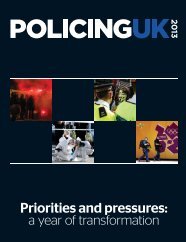THE POLICING GREEN PAPER - Police Federation
THE POLICING GREEN PAPER - Police Federation
THE POLICING GREEN PAPER - Police Federation
You also want an ePaper? Increase the reach of your titles
YUMPU automatically turns print PDFs into web optimized ePapers that Google loves.
is that police numbers will be reduced with ‘operational staff’ as opposed to police officers<br />
providing front line policing.<br />
• With regard to the workforce modernisation program, we are concerned that all pilot projects<br />
are declared a success no matter what the outcome. We call for a full, independently led<br />
assessment of the positive and negative aspects of pilot projects before they are considered<br />
for national roll-out.<br />
• The move towards delegating tasks (positions & duties) away from officers towards staff may<br />
have the effect of making officers more remote from the community with unintended<br />
consequences. For example, the presence of beat officers in control rooms/call centres<br />
provides an invaluable local knowledge which police staff may not be able to acquire.<br />
• We welcome the acknowledgement that sergeants are ‘the linchpin of the police service’, that<br />
they have clear training needs and that effective support for the sergeant role also requires<br />
the development of national standards, accreditation and the promotion process. However,<br />
we are very concerned that there are no consultation questions about these issues and that<br />
the Green Paper does not suggest any specific proposals to address these issues other than<br />
the government ‘expects’ forces to act on them under the threat on another HMIC inspection<br />
in 2010. Any action to remedy the existing training deficiencies (of all ranks) will require<br />
additional funding. There are no proposals for increased funding in the Green Paper. We<br />
seek absolute assurances from the government that there will be full consultation with the<br />
PFEW prior to any changes in employment status which have an impact on officers’ pension<br />
entitlement.<br />
• The proposals for a three- year equality, diversity and human rights strategy outlined in the<br />
Green Paper hold the promise of further embedding diversity within and across the <strong>Police</strong><br />
Service. However, care needs to be exercised to ensure that this process does not develop<br />
(or degenerate) into a top-down, ‘tick-box’ exercise.<br />
• It is evident that the introduction of PCSOs has widened diversity within the service.<br />
However, it is our view that this should not be at the expense of increasing the numbers of<br />
fully trained officers; a similar recruitment drive for police officers at the neighbourhood level<br />
should be able to attract applicants from a similarly diverse background. Care is needed to<br />
ensure that diversity does not become the preserve solely of PCSOs.<br />
• The increased specialisation of PCSOs in neighbourhood policing may reduce the contact<br />
officers have with their communities and may reduce trust and confidence in police officers.<br />
We run the risk of limiting the contact officers have with their community to only that of<br />
confrontation, coercion and confinement.<br />
• Whilst we broadly welcome the increasing interest in members of the community wishing to<br />
serve as special constables, we are concerned that the planned 43 per cent increase<br />
appears to present the impression that a corps of volunteers is a substitute to the roles<br />
performed by our colleagues who have committed themselves ‘full-time’ to a life of policing,<br />
without whom there would be no police service as we know it. The reality is that special<br />
constables are not under obligation to perform tour of duty and their availability can never be<br />
taken for granted.<br />
• We welcome the new approach to targets but we cautiously wait to see how quickly the<br />
system will change and hope that the new system of locally driven targets does not see a<br />
continuation of the ‘what gets measured gets done’ approach to policing.<br />
12
















